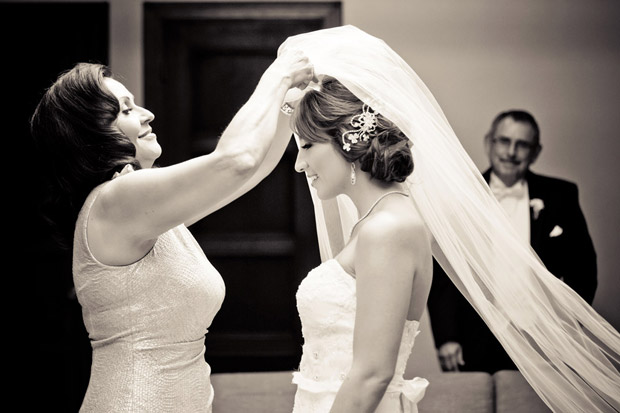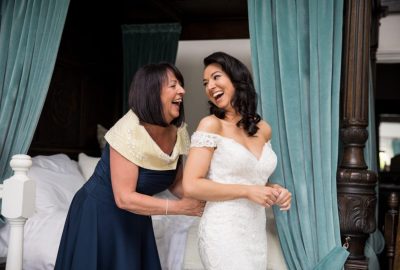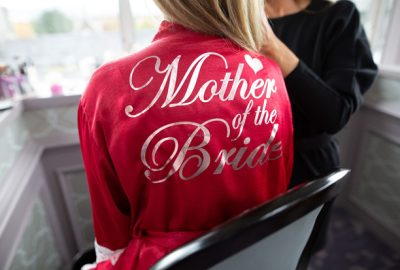It’s unfortunately true that some soon-to-be-married couples have to tread carefully due to sensitive situations with their own parents for instance if they’re divorced or separated. In many cases, relatively smooth sailing becomes a bit choppy once the wedding planning is on. To help you stay calm and do the right thing, we’ve compiled a list of some common scenarios couples may have to deal with, along with useful advice.
The most important thing about sorting out family problems is having plenty of time to do it. We know it may not be pleasant to bring up old issues, but it could get a whole lot worse when you deal with them just a few days before the big day. Not just for the parents, but also for you – very few brides can spare the time or the nerves to deal with parents’ tantrums when the date is so near.
Your parent wants to bring a partner to the wedding
It’s natural to worry about the other parent’s reaction, so the best way to resove this is simply by talking. Just ask each parent how they feel about the situation, and let their answer dictate what you’ll do next. Ideally, they will say that, even though it may be a bit awkward, they wouldn’t dream of spoiling your big day. But if they say it’ll be difficult, give them loving support. Ask what can be done to make them more comfortable and to give you some suggestions. Assure them you won’t create any awkward situations where they’d be forced to be in each other’s company – for example, sitting everyone together at the same table. Check whether arranging a pre-wedding meeting may be possible. This may just be the thing to help things go more smoothly on the wedding day. You’ll be glad to know that, in most cases, the sense of occasion helps keep unwanted behaviour in check – plus, they won’t want to be embarrassed in front of 80 other people. Don’t wait until the last minute to bring up this topic – a few days before the wedding just isn’t enough time to settle frayed nerves.
One parent refuses to come to the wedding if the other parent’s partner is there
Emotional wrangling like this should never take place while you’re planning a wedding – it’s awfully impolite and you really don’t need it. This is hard for some, but you have to apply the logical tactic here – put the ball in the court of the person who’s presented you with this dilemma. Say something like: “I’m really sorry you’re thinking about not coming to my wedding because this person will be there. You know I love you and I want you to be there very much, it just won’t be the same if you’re not there. I’ll respect whatever you decide, but I hope you’ll be there to share the day with me.” Then leave it. Keep them informed throughout the planning so they don’t feel excluded, and be prepared to revisit the topic when they decide to bring it up again. But in most cases, it all works out in the end.
Wedding photos with divorced parents
Logically speaking, it’s better to have photos with each parent separately, than no photos at all. You could also ask the photographer to try and catch you together as you mingle, as opposed to formal photo arrangements. In fact, asking your photographer for advice on what to do is a good idea. You don’t have to go into any detail – just ask whether they ever worked on a wedding with divorced/separated parents, and do they have any suggestions for photos. The photographer will probably tell you something you hadn’t even thought about yourself. Once you decide, tell your parents in advance – don’t wait to do it on the day. Simply share the photo list or schedule with them, and say ‘this is what we’ve planned’.
Involving other suppliers
Remember how we’ve said in the past you should always tell the DJ what songs you don’t want played at your wedding? Well, you can also tell the DJ you don’t want a parents’ dance – and you don’t even have to explain why. Just tell him you’d prefer only the first dance, or first dance with bridesmaids and groomsmen, or a dance with the groom’s dad while your new husband dances with your mum. It’s your preference. It’s best to ask this than have to sit mortified through an argument on the dance floor. Similarly, inform the wedding planner, the toastmaster and anyone else who would usually mention the parents.
Sitting divorced parents at the ceremony
Even if relations between divorced or separated parents are cordial, it’s a safe bet to sit them separately, but in close proximity, especially if one of them is bringing a partner. Most of the time, the mam gets to sit in the front pew if there’s room, or in the second. The dad should sit at the other end of the same pew with several people in between, or in the pew behind. The distance of sitting should be considered with the degree of estrangement – if their relationship is fragile, farther away may be best.
Walking down the aisle – dad vs stepdad
Family situations vary and it’s impossible to find an answer to every single scenario. Only the bride can say who she truly wants to walk her down the aisle, and that’s the most important thing of all. However, it’s not always that straightforward. Here are some possible options for resolving the aisle walking conundrum.
- if there’s a dad and a stepdad, and they get along, they could both walk you down the aisle, side by side, or one walks you halfway, the other one the rest of the way
- if they don’t get along, choose one to walk you, and ask the other to do a reading so they still feel a part of the ceremony
- your mam walks you down the aisle instead
- you walk up the aisle alone preceded by the bridesmaids, and the dads wait for you at the top, both give you a kiss and a hug
- walk with your other half – this is done in many countries and is not at all strange
- do away with the tradition completely and walk into the ceremony with all the guests
Sitting divorced parents at the reception
We’ve already touched upon this subject when we talked about top table dilemmas, so a tactful option (if there is tension) is to keep the parents away from the top table and place them nearby instead. Some call it ‘hosting’ their own tables, which means they’ll be pretty much the soul of their circle. It’s important to keep them apart, as it will make things far less awkward for other people sitting at the same table. Ask the venue for a floor plan so you can see which two tables are best for this purpose.
Father of the bride speech
It’s a similar issue to who’s walking you down the aisle (above). Who gives the speech if there’s a dad and a stepdad? Again, you have several options. Either one of them or none at all, or your mam instead. Or, the dads could say a few words each, but it would be a good idea to coordinate beforehand, if at all possible, so they don’t both say the same thing. Take a look at who’s already speaking at your wedding, and figure out if you truly need to consider this, or simply do without.
Toasting Etiquette
Many etiquette guides will have you believe a wedding without toasting just isn’t acceptable, but that’s not exactly the case. Luckily, in case of divorced or separated parents, this is an easy issue to solve. If you’re having speeches, each person will most likely end theirs with a toast to the newlyweds, so that’s two or three toasts right there. Is it necessary for the parents to do a fourth one? Not really. If you’re having just one or two speeches and would really like another toast, why not do it together with your other half? This one will be to the guests, and in return they’ll raise their glasses to you.
Invitations from divorced parents – wording
Last but not least, the question of invitations. As with everything else with weddings, things have changed a lot since parents paid for the whole thing. Nowadays, couples are often putting only their own names on invitations, because they’re paying and choosing the guests. It’s only the names you have to consider – the rest of the wording will remain as it usually does. A tactful way out of this dilemma is to say: ‘Together with their families, the bride/groom and bride/groom request the honour of your presence…’ etc. This avoids listing any parent names and hurting feelings.
If, however, you’d like to keep to tradition, or parents have made financial contributions to your big day, you might want to list their names. Instead of saying Mr and Mrs Cullen, which would make it look like they’re still married, say Ms Fiona Cullen and Mr Liam Cullen or Mrs Fiona O’Henry and Mr Liam Cullen if your mam is remarried or is using her maiden name.
Remember, you can always speak to your parents before you order the invitations, so they know in advance what will be written. This will allow you to decide on any alternatives together. But the final decision is always yours and your soon-to-be-spouse’s.
If you have a situation you’d like to discuss, let us know and we’ll be glad to help.
Main image courtesy of True Photography



